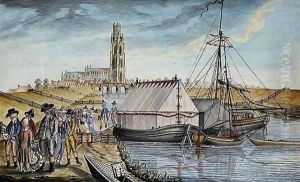Sarah Sophia Banks Paintings
Sarah Sophia Banks was an English collector and antiquarian, born in 1744 into a family deeply embedded in the intellectual and scientific circles of the time. She was the sister of the renowned naturalist Sir Joseph Banks, who accompanied James Cook on his first great voyage (1768–1771), a journey that laid the foundation for her brother's fame and indirectly influenced Sarah's pursuits. Unlike many women of her era, Sarah Sophia Banks was not content with the limited roles society prescribed to her gender. Instead, she channeled her energies and resources into building an extensive collection that encompassed coins, medals, prints, and other ephemera. Her work was pioneering in the field of numismatics (the study of coins and currency) and contributed significantly to the historical documentation of her time.
Sarah Sophia Banks's interests were not confined to any single domain. Her collection included items of political, social, and cultural significance, reflecting her wide-ranging intellectual curiosity. She meticulously cataloged each item, creating an invaluable resource for researchers. Her collection became known for its breadth and the insight it provided into 18th-century British life, touching on aspects of commerce, politics, and daily existence. Unlike her brother, who was widely celebrated in his lifetime, Sarah's contributions were recognized more quietly, though they have gained appreciation over time for their historical value.
After her death in 1818, Sarah Sophia Banks's collection was dispersed, with significant portions going to various institutions. The British Museum received a large part of her numismatic collection, where it remains an important resource for scholars. Through her dedicated collecting and preservation of historical artifacts, Sarah Sophia Banks left a legacy that extends beyond her lifetime, offering a window into the complexities and nuances of 18th-century British society. Her work demonstrates the significant role that women, often overlooked by the historical record, have played in the preservation and interpretation of history.
